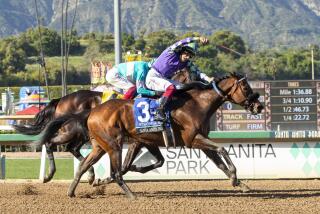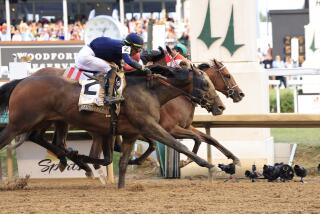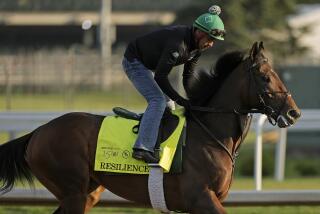What He Couldn’t Buy Was Americans’ Love
The prince owned last year’s horse of the year, Point Given, and he might have come within one race of sweeping this year’s Triple Crown with War Emblem, but he still had much to accomplish in racing.
For one thing, he still needed to make Americans like him.
Because of his heritage, and because of what happened in this country last Sept. 11, the Saudi Arabian-born Ahmed bin Salman could never make as many friends here as his champion horses did. War Emblem’s improbable win in the Kentucky Derby brought muted cheers at Churchill Downs, and later there were suggestions that the prince hadn’t really won the Derby, he had bought one. Two weeks later, at Pimlico, the prince’s flights of humor fell flat as War Emblem won the Preakness. Then three weeks after that the prince was derided for being a no-show at Belmont Park, 20 miles from where the Twin Towers once stood, on the day his colt was beaten.
A couple of hours before the Belmont Stakes, it was left to Richard Mulhall, Prince Ahmed’s racing manager in the U.S., to explain why War Emblem’s owner wasn’t in New York. Mulhall said something about the prince’s family obligations, but nobody in a crowded Belmont press box believed him.
“I think more people like him than dislike him,” Mulhall also said, but few within earshot were nodding in agreement.
Prince Ahmed, who died Monday of a heart attack at 43, was on the wrong side, running horses in a nation wronged, and there was nothing that War Emblem or Point Given or any of his many talented thoroughbreds could do to undo that.
That the prince bought the Derby was a bum rap, promulgated by those who don’t understand the game. If the Derby is your holy grail, you get to the Churchill winner’s circle on your hands and knees if that’s what it takes. Whether you buy horses early or late, or home-grow them, is beside the point. There’s no extra credit for knowing your horse since he was a weanling. Every year, owners and trainers with prospects that haven’t panned out become last-minute shoppers, and the only difference between them and Bin Salman was that he got lucky and pulled it off.
War Emblem, purchased less than a month before the race, caught a tactics-free Derby, one unlike almost all the others; it took the prince’s colt to prove to us that this is a so-so crop of 3-year-olds.
Still, after the Derby was his, Bin Salman had to repeatedly defend himself.
“If I could buy next year’s winner, I’ll do that too,” he brashly said.
After Sept. 11, it will always be a tough room for a Saudi doing stand-up. The interview tent didn’t shake with laughter.
In Baltimore, the prince, having noted how his clowning trainer, Bob Baffert, had drawn laughs from Del Mar to Dubai, went to the Pimlico infield and wore the Preakness trophy on his head. The trouble was, Baffert’s own act had long worn thin. Marylanders were not even ready for Abbott, and here they had Costello on the same stage.
For the prince, skipping the Belmont was the smart thing to do. There was no less tension, or high security, this June than there was for the Breeders’ Cup, run at the same track about six weeks after the terrorist attacks. Wisely, Bin Salman wasn’t there that day to see his horses run, either.
He might have improved his image problems with better access, but he resisted one-on-one interviews, preferring to dole out post-race sound bites instead. For someone grounded in worldwide communications, he surely knew better, but he seemed to tire quickly of the incisive political parrying. At the Preakness, he didn’t even want to talk about the $1-million multi-race bonus issue that he and Russell Reineman, the disenchanted minority owner of War Emblem, were still kicking around. See my lawyer, the prince said.
For all anybody knows, the last lengthy interview Bin Salman did was with a reporter from The Times over lunch at the Santa Anita Turf Club four years ago. For openers, Bin Salman jokingly asked what his fee would be for the session. “Do I call you prince?” the reporter wanted to know.
“Ahmed will be good enough,” he said.
He hauled out pictures of his four daughters. One, 5 years old. Triplets, just over a year old. A son came along later, born just days before a big win at Santa Anita, in a race the prince was forced to miss.
He named one of his fillies Triple Treasure, after the triplets. He named one of his top fillies Habibti, an Arabian term of endearment that he often called his wife and daughters. The name of the champion Point Given came out of a contentious board meeting held one day in London.
“Point taken!” one of the prince’s executives said.
“Point given!” was the answer.
“I said to myself right then and there,” the prince said, “that I’m going to remember that name and give it to one of my horses someday.”
At the end of the day, he was a man with more horses than names.
“If I like a horse, the sky’s the limit,” he said in 1996, after he had paid $900,000 for Sharp Cat, who was one of his favorites and became one of his best. He kissed the filly on the nose after she won races, with all the warmth that he had for his children.
Prince Ahmed also paid $900,000 for 90% of War Emblem, who made him one of only three men--after John Galbreath and Paul Mellon--to win both the English and Kentucky derbies. Bin Salman won at Epsom with Oath in 1999. Would the prince have traded either win to have won the hearts of America? Had he ever let us inside, we might have known.
More to Read
Go beyond the scoreboard
Get the latest on L.A.'s teams in the daily Sports Report newsletter.
You may occasionally receive promotional content from the Los Angeles Times.










